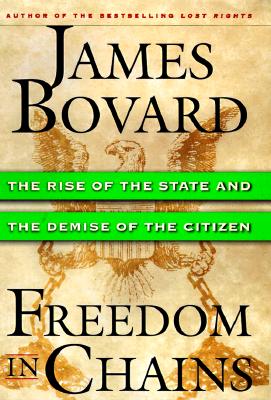Here’s a piece spun off from my 1999 book, Freedom in Chains. In 2007, New York Times reporter Mark Leibovich was writing a piece on czars, called me up and asked if I was still a libertarian. I burst out laughing – but his question was understandable inside the Beltway. From his article: “‘I don’t think any of the founding fathers looked to the Russian model,’ said James Bovard, a libertarian writer and lecturer whose contemptuous essay in 2000, ‘Ten Thousand Czars,’ made him something of an ‘anti-czar czar.’ Bovard dismisses the appointment of [Gen. Douglas] Lute [as a czar for Iraq] as ‘the same old scam that politicians have used for a long time whenever there is a failing policy.'” I scoffed at czars across the board; Leibovich noted, “Bovard proposes that government czars at least get to wear special hats, to make them feel special and to differentiate them from other officials.” I had specified that the czars should wear the same kind of hats used in Gilbert and Sullivan operas, but that detail didn’t make the final cut of the NYT piece. But I heartily appreciated his “anti-czar czar” tag. [[Following piece was fairly heavily edited with some recasting that…. well… anyhow, IBD had fine editors back then.]]
Investor’s Business Daily. July 16, 1999
Ten Thousand Czars
By JAMES BOVARD
Few Americans think about the cost of giving bureaucrats more power and trust than to the citizenry. But the cost goes beyond mere inconvenience. It destroys liberty.
You don’t need to look any further than the steady erosion of the rule of law that should govern the federal regulators, inspectors, enforcers and tax collectors. The due process clause has been largely swept aside in citizens’ dealings with such state officials. While courts have created new due process rights for welfare recipients, disruptive school children, even criminal defendants, the rights of farmers, homeowners, parents and businessmen have been shredded.
The chief force in this change has been the courts. The federal judiciary has created an overwhelming presumption in the legality of the actions of federal agencies, thus sanctioning many acts by government officials that once would have been considered outrageous, illegal or unconstitutional.
Government officials are supposedly so far superior to private citizens, they must be allowed to make up the rules as they go along – or to even change them retroactively.
This is the hallmark of federal environmental policy – such as Superfund’s routine ruining of companies and individuals for legal actions committed decades earlier.
Arbitrary power converts government employees into a ruling class. Arbitrary power has become more fashionable as government itself has been exalted.
It is symptomatic of the contemporary attitude toward government that the term ”czar” now has a positive connotation – be it a ”drug czar,’‘ ”AIDS czar,” ”health-care czar” or ”energy czar.” Americans of earlier generations would be as shocked by the current adulatory use of the term ”czar” as contemporary Americans should be shocked of the use of ”fuhrer” as a compliment for a political leader.
In an 1866 Supreme Court case involving the power of military governors in the conquered Southern states, one attorney declaimed to the court about his suffering plaintiffs: ”So far as constitutional liberty is concerned, they might as well be living under a Czar or a Sultan… as in this free country.”
In an 1895 case, an attorney denounced a newly enacted income tax as conferring powers on the federal government ”worthy of a Czar of Russia proposing to reign with undisputed and absolute power; but it cannot be done under this Constitution.”
Arbitrary power is the epitome of welfare state fairness. But this ”fairness” vests in some individuals the power to coerce, subjugate, reward and punish other citizens, according to their own whim. The only way that pervasive arbitrary power can be assumed to automatically improve society is to presume that the people who wield that power are vastly morally superior to the victims of that power.
Arbitrary power is the antithesis of equal rights – resting on government employees’ right and power to dictate who shall be fleeced, indicted or jailed. Arbitrary power brings out the dark side of the State and helps explain why government service can attract the dregs of humanity. (Prison guards get no respect.)
During the Spanish inquisition, the central Inquisitorial authority could interfere with and ban any sentence or word in any book. A great number of administrators and censors were necessary for imposing such controls, and the person being censored was forced to pay the cost.
Charles Lea noted in his classic History of the Inquisition in Spain: ”The powers granted to the revisors gave so large an opportunity for oppression and extortion that the position was eagerly sought for.’ Those bureaucrats had economic and career incentives to steal and plunder in the name of goodness and religion.
Friedrich Hayek, in his famous essay, ”Why the Worst Get on Top,” showed why, once government acquires great power, ”the readiness to do bad things becomes a path to promotion.”
Faith in discretionary power means faith in giving government officials the power to punish whom they please -and assuming that this will make America a better society. Yet, at some point, the sheer number of threats government makes purportedly to protect the citizen destroys the citizen’s ”domestic tranquillity.”
Paternalism creates a vicious cycle: the more power government acquires to control people, the more citizen naturally fear the government. Not surprisingly, citizen distrust of Washington has risen with each new assault on people’s rights by Congress and the bureaucracy.
James Bovard is the author of ”Freedom in Chains: The Rise of the State & the Demise of the Citizen” (St. Martin’s Press, 1999).


Comments are closed.